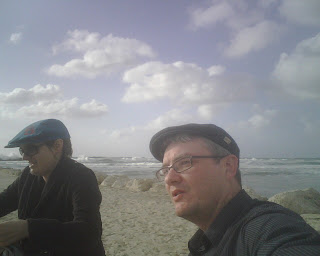Memory is Practice - The Repetitive Journeys of Parashat Masei
In “Tense Past:
Cultural Essays in Trauma and Memory,” Michael Lambeck argues that rather than
simply being objective or subjective, memory is performative. In other words, memory is practice.
One sees this in a
therapeutic setting working with only-children versus children with siblings,
especially siblings close in age. The siblings often recall more specific
narrative details of their childhood than do only-children, whereas
only-children will have punctuated memories of the main-events. The theory
behind this is that the siblings will go into their room at night and recount
the day to each other while the only child will be reminded by their parent(s)
or guardian(s) of the events with enough impact to be worthy of family
discussion. This is not to try and weigh
in on the debate of having one or multiple children, simply to say that if
memory is performative, we will have different types of memory development
based on those with whom we partner in life to make and then rehearse the
memories as we work on creating a cohesive self-narrative.
Midrash, while
commenting on Parashat Masei seems to
have advanced understanding of this aspect of human psychology. The beginning
of Masei is a recounting of all the
way-points on the journey through the wilderness, most of the verses consisting
of the type of repetitive passages in Torah where we either doze off or at the
least ask “What’s the point?”
In Midrash Tanchuma, a loose series of midrashim and homilies bearing the name of Rav Tanchuma but edited
between the 8th and 16th centuries, we are offered a much more sophisticated
reading into the repetition. Quoting from Numbers 33:2, “Moses wrote down their
goings out to their journeys, by the command of the Eternal,” the midrash comments:
This is comparable to a king whose child was ill, and
he took him to another place to heal him. On their return journey, the father
recounted all their stations: “Here we slept,” “here we caught cold,” “here
your head hurt.” By the same token, the Eternal said to Moses: Recount for them
all the places where it was that they had angered Me.
Ignoring for this
moment the filter by which Moses was to choose locations, there is a beautiful
compassion to this rehearsal of memory. The illusion of memory is that we have
perfect recall of anything that matters. To put it more bluntly, if we are in
an argument, we are sure that our memory that is supporting our narrative is
accurate, and if contradictory to our partner in the dialogue, our first
reaction is to be sure of our side and doubt the other.
Yet how many times for
how many reasons has our life gone on a bit without our conscious presence in
our own drama? Days drone on, routine takes hold, and we blink to find years
have passed. We have entered the trance of existence that most Jewish ritual
attempts to question.
Looking at this a
different way, what does it take for us to realize that because of how memory
functions, none of us are reliable narrators of a purely objective life? The
Midrash is suggesting that each of our stopping points out of slavery on the
way to redemption included moments where at best we moved without consciousness
of the movement and at worst we chose to remember differently or not at all
because we were not the heroes of the narrative-- we were the ones that
disappointed.
Part of the “truth” of
Torah and the deeper message of Masei
is to remember that we as well rehearse the moments when we have not acted
heroically. The month of Elul and our process of asking forgiveness approaches
soon, and Masei reminds us to recount
even the points of our path where we fell.

Comments